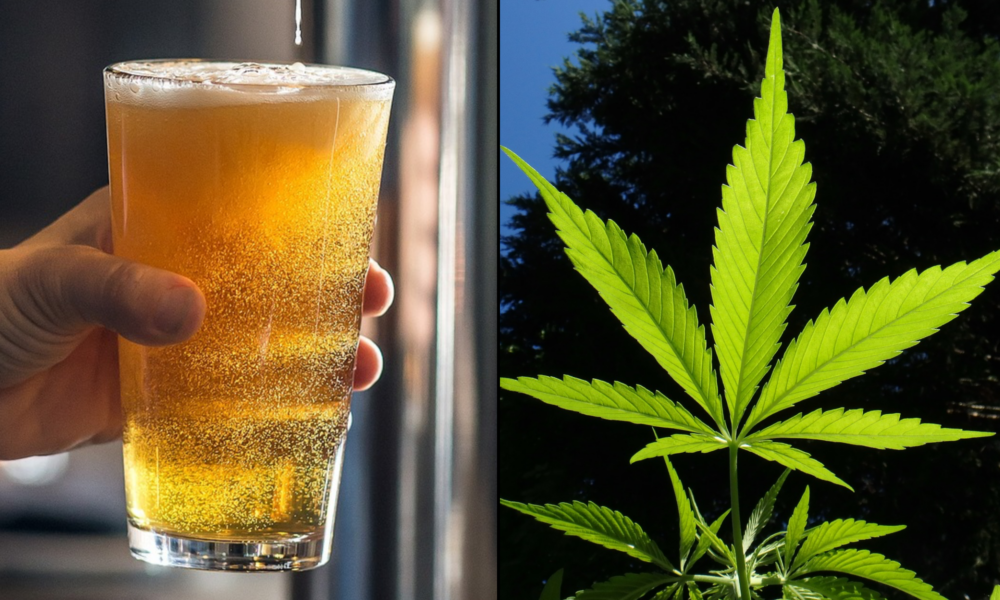A new review of scientific literature around CBD and its effects suggests that the cannabinoid could be useful in managing symptoms of alcohol use disorder (AUD) by modulating brain networks that perpetuate addiction.
The review, from authors at the University of Sydney and local health districts in the Australian city, attempts to “theorise the potential neurobiological mechanisms by which CBD may ameliorate various symptoms of AUD.”
“Previous research suggests that CBD may affect salience, reward, emotion generation and regulation and executive control (including inhibition control, working memory and self-monitoring) processes,” the report, which was published on Thursday in the Journal of Cannabis Research, says. “These processes are highly relevant to alcohol seeking behaviours, suggesting that CBD may have potential in the management of alcohol use disorder.”
“CBD appears to modulate neurotransmitter systems and functional connections in brain regions implicated in [alcohol use disorder], suggesting CBD may be used to manage AUD symptomatology.”
To conduct the review, researchers looked at previously published neuroimaging studies involving the effects of CBD on healthy brains, examining how the cannabinoid affected brain activity as well as subjective measures like anxiety and mental sedation.
“Although not supported by all the studies presented,” they wrote, “the majority of the neuroimaging literature presented in this systematic review suggests that CBD may normalise these processes through its effect on mesocorticolimbic, limbic, salience and fronto-striatial signalling.”
“Given the relevance of the networks affected by CBD in this review in alcohol seeking behaviour and relapse,” the team concluded, “research into the effect of CBD on brain and behaviour in populations with AUD to determine any potential role for management is warranted.”
The findings add further weight to the idea that cannabinoids such as CBD might be useful in treating substance use disorders and help explain the mechanisms behind potential benefits.
“There is a well-researched link between chronic heavy alcohol use impairs reward processing, salience attribution, emotion regulation and executive functioning (including inhibition control, working memory and self-monitoring) through the perturbation of various brain networks implicated in the development and maintenance of AUD,” the study says, adding that it’s “previously been suggested that CBD may normalize this perturbed neurocircuitry and subsequently support positive behavioral changes.”
“Here,” authors wrote, “neuroimaging findings support the notion that CBD may modulate neurocircuitry implicated in the maintenance of AUD.”
The findings add to the growing body of research around what sorts of conditions CBD might help treat—and how. A separate study recently suggested, for example, that oral doses of CBD might help regulate menstrual-related symptoms, for example irritability, anxiety and stress.
Meanwhile the National Animal Supplement Council (NASC) recently concluded that CBD is “safe for long-term use” in dogs—a significant finding given emerging research that cannabis can effectively treat conditions such as anxiety and certain skin diseases among canines.
Amid state-level legalization of marijuana and the federal government’s legalization of low-THC hemp and its derivative products, interest in research around hemp industry and commerce has also ballooned in recent years.
Last month, new federally funded research into how to distinguish hemp and marijuana in order to assist crime labs identified two new methods for differentiating the two forms of cannabis.
U.S. Customs and Border Protection (CBP) also put out a solicitation in 2022, seeking portable marijuana analyzers to quickly identify cannabinoid profiles and help distinguish between marijuana and hemp.
And in 2019, the Drug Enforcement Administration (DEA) separately announced that it was seeking a device to “provide specificity to distinguish between hemp and marijuana” since the former crop was legalized.
USDA has also sent out thousands of surveys to hemp farmers, meant to understand how the industry is growing but also identify challenges in business and regulation. The department launched its first annual survey in 2021, and it updated the questionnaire last year before distributing it to farmers and releasing a report with findings that showed significant declines in the value and production of the crop in 2022.
The Food and Drug Administration, for its part, is considering a proposal to allow hemp seed meal as livestock for hens.
Meanwhile, USDA has been reportedly revoking hemp licenses for farmers who are simultaneously growing marijuana under state-approved programs, underscoring yet another policy conflict stemming from the ongoing federal prohibition of some forms of the cannabis plant.
Federal hemp rules could be further amended as part of the next iteration of large-scale agriculture legislation. The 2018 Farm Bill that legalized the crop was supposed to be updated last year, but it’s been extended through much of 2024.
Lawmakers and stakeholders are eyeing a number of proposals that could be incorporated, including measures to free up hemp businesses to legally market products like CBD as dietary supplements or in the food supply and to remove restrictions on participation in the industry by people with certain prior drug convictions.
For the time being, the hemp industry continues to face unique regulatory hurdles that businesses have blamed for the crop’s value plummeting in the short years since its legalization. Despite the economic conditions, however, a recent report found that the hemp market in 2022 was larger than all state marijuana markets, and it roughly equaled sales for craft beer nationally.
Meanwhile, internally at USDA, food safety workers have been encouraged to exercise caution and avoid cannabis products, including federally legal CBD, as the agency observes an “uptick” in positive THC tests amid “confusion” as more states enact legalization.
21 State Attorneys General Push Congress To Regulate Intoxicating Hemp Products
Read the full article here









